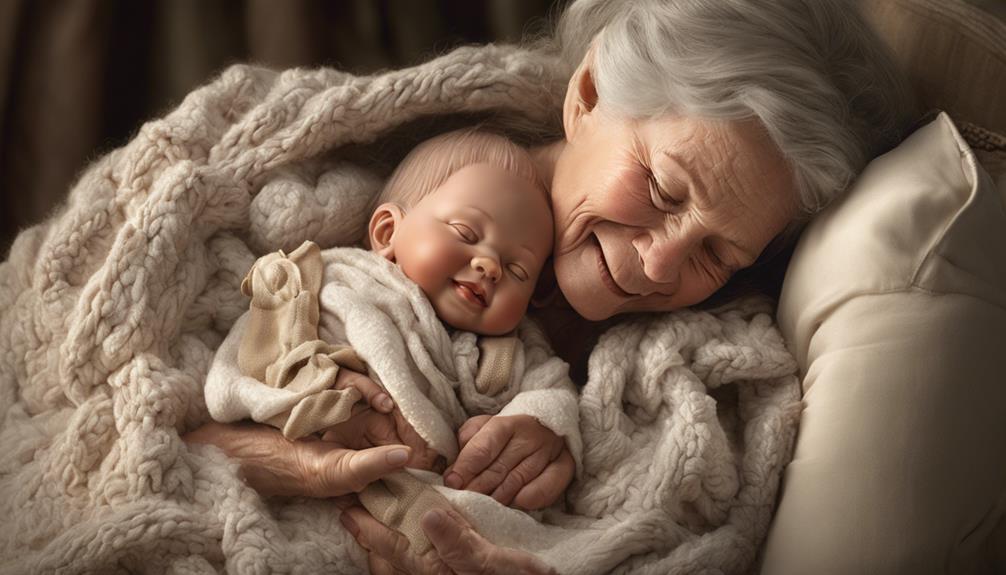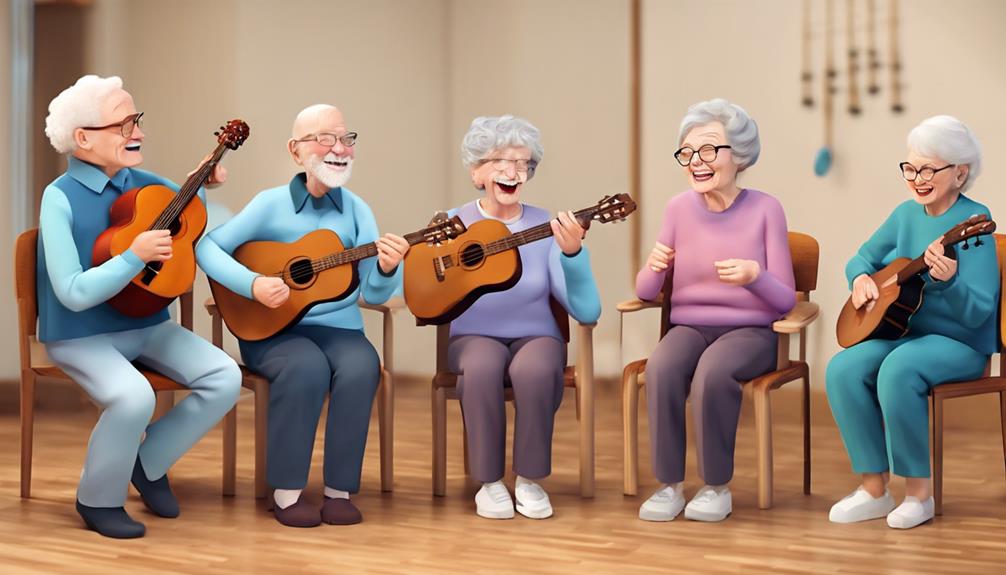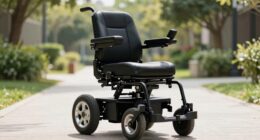When considering the impact of technology on the elderly, one cannot ignore the significant role that robotic dogs play. These advanced companions have revolutionized elderly care by providing a unique blend of support and interaction, ultimately improving their overall quality of life.
But what exactly sets these robotic canine companions apart and how do they manage to improve the quality of life for seniors in such a remarkable way? Let's explore the fascinating realm of robotic dogs for seniors and uncover the multitude of benefits they bring to the lives of older adults.
Key Takeaways
- Enhances emotional well-being and companionship for seniors.
- Stimulates physical and mental health through interactive engagement.
- Reduces loneliness and isolation, promoting social interactions.
- Improves overall quality of life by providing constant companionship and purpose.
Benefits of Robotic Dogs for Seniors
Robotic dogs for seniors offer a revolutionary solution to improve emotional well-being, physical activity, and companionship in older adults. These companion pets hold immense potential in enhancing the lives of seniors, particularly those facing conditions like dementia or Alzheimer's.
The presence of a robotic dog can provide a sense of purpose to seniors, reducing stress and loneliness while promoting social interactions. As cognitive decline is a common concern in aging individuals, the interactive nature of these robotic dogs can help stimulate the mind and keep seniors engaged.
Studies have shown that the companionship offered by these robotic pets can significantly improve the mood and overall quality of life for seniors. By incorporating robotic dogs into the lives of older adults, we can create a more supportive and enriching environment that caters to their emotional and physical needs.
Promoting Companionship and Social Interaction
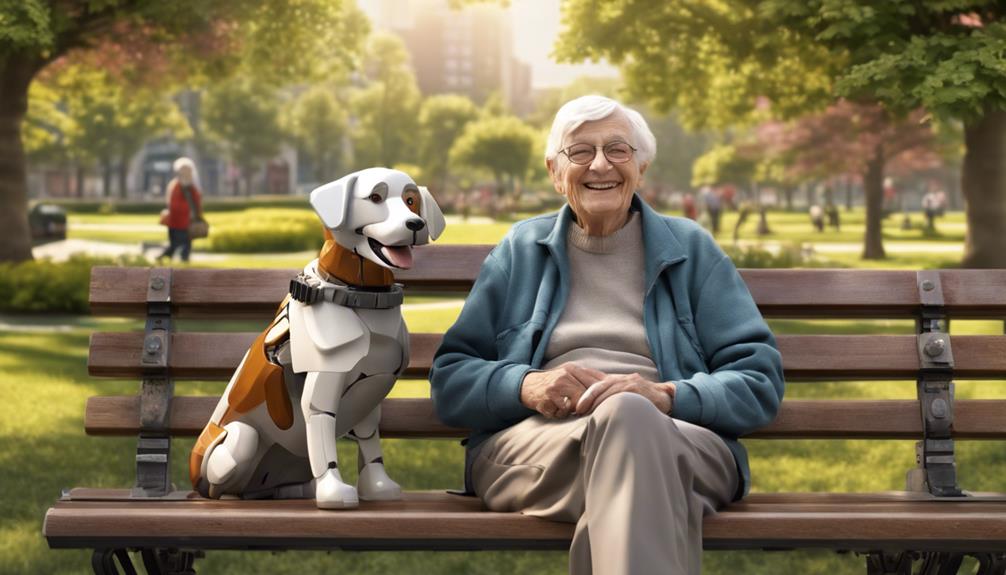
How can these interactive companion pets enhance social connections and combat feelings of loneliness in seniors?
Robotic dogs for seniors play a vital role in promoting companionship, encouraging social interaction, and providing emotional support. Here are some ways these robotic pets help combat loneliness and enhance quality of life:
- Constant Companionship: Robotic dogs offer seniors a constant source of companionship, reducing feelings of isolation.
- Responsive Behaviors: By engaging with users through responsive behaviors, these companions stimulate social interaction and emotional connections.
- Combatting Loneliness: Robotic dogs help seniors combat feelings of loneliness and isolation by providing consistent company and interaction.
- Encouraging Activities: These companions encourage seniors to engage in various activities, fostering social connections and reducing solitude.
- Opportunities for Bonding: By mimicking real pets, robotic dogs create opportunities for seniors to bond and form meaningful relationships, enhancing their overall quality of life.
Enhancing Physical and Mental Well-being
To further improve the well-being of seniors, it's crucial to explore how interactive companion pets contribute to both physical and mental health. Robotic dogs play a vital role in enhancing physical and mental well-being among older adults. These companions offer more than just comfort; they engage seniors in physical activities, promoting movement and exercise that improves overall physical health.
Additionally, the cognitive stimulation provided by interacting with robotic dogs helps maintain and enhance cognitive abilities in seniors. The emotional support offered by these robotic pets is invaluable, reducing stress, anxiety, and feelings of loneliness, thus significantly boosting mental well-being.
Furthermore, the companionship and comfort provided by robotic dogs create a sense of routine and purpose, leading to a more structured and fulfilling daily life for seniors. Studies have shown that these interactions can elevate mood, increase social engagement, and foster emotional connections, all contributing to a higher quality of life for older adults.
Addressing Loneliness and Isolation
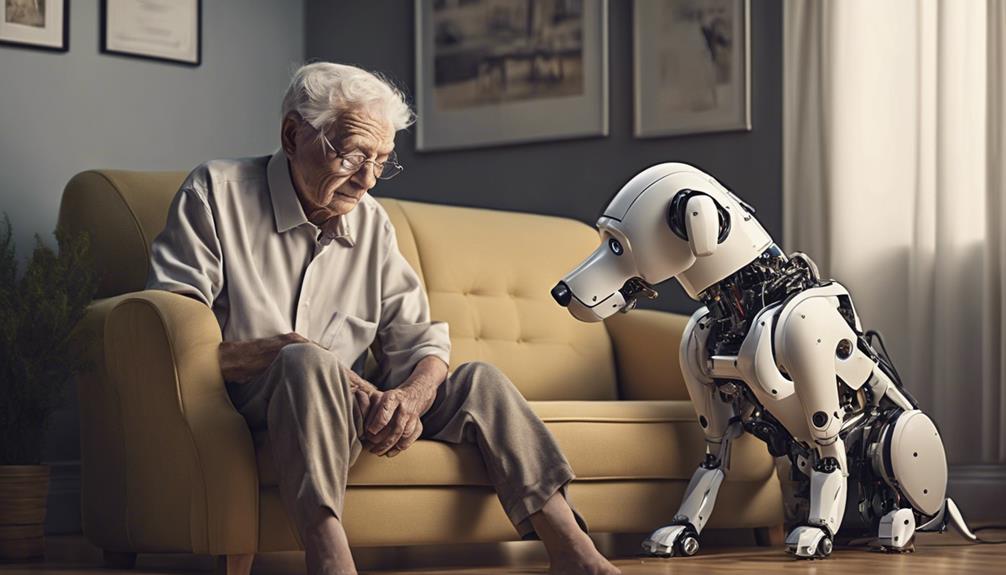
Loneliness and isolation among seniors pose significant challenges that necessitate compassionate solutions tailored to enhance emotional well-being and foster meaningful connections. Robotic dogs offer a unique way to address these issues by providing constant companionship and emotional support.
Here are some key ways robotic dogs help seniors combat loneliness and isolation:
- Constant Companionship: Robotic dogs offer seniors a constant presence, reducing feelings of solitude.
- Emotional Well-being: Studies demonstrate that interaction with robotic pets can enhance emotional well-being in older adults.
- Source of Comfort: Robotic dogs provide comfort and emotional support, especially for seniors living alone.
- Coping Mechanism: The presence of robotic dogs helps seniors cope with loss, grief, and physical limitations by offering companionship.
- Quality of Life Improvement: Robotic dogs contribute to improving the quality of life for seniors by providing consistent emotional connection and support.
These robotic companions play a crucial role in alleviating loneliness and isolation, ultimately enhancing the overall well-being of seniors.
Improving Quality of Life for Seniors
Robotic dogs have emerged as a groundbreaking solution for enhancing the quality of life for seniors, offering companionship, reducing stress, and promoting overall well-being. These interactive pets provide a sense of companionship and joy, especially for seniors living with Alzheimer's or other chronic conditions. Companion Pets not only help alleviate feelings of loneliness but also encourage physical activity and mental engagement, contributing to emotional well-being and cognitive stimulation.
Research indicates that robotic pets positively impact seniors by boosting their mood and overall quality of life. Unlike traditional pets, robotic dogs require minimal maintenance, eliminating the need for feeding, grooming, or veterinary care. By fostering emotional connections and providing constant companionship, these innovative companions play a vital role in improving the well-being and happiness of our beloved seniors.
Embracing robotic pets as part of the care for our loved ones can significantly enhance their daily lives and bring comfort to their hearts.
Frequently Asked Questions
What Are the Benefits of Robotic Dogs?
When we explore the benefits of robotic dogs, we uncover a world of companionship and comfort. These lifelike companions offer a unique blend of interactive engagement and stress relief.
Are Robotic Pets as Good as Real Ones for Older Adults?
Absolutely, robotic pets can be just as good as real ones for older adults in certain situations.
While they may not fully replicate the experience of having a live animal, robotic pets offer companionship and emotional support without the same level of care required.
They can reduce loneliness and provide comfort, making them a valuable option for seniors who may have limitations in caring for a real pet.
Are Robotic Pets as Good for Mental Health as the Real Thing?
Absolutely, robotic pets can be just as beneficial for mental health as real ones. While some may argue that they lack the authenticity of living animals, studies show that robotic pets provide companionship, emotional support, and stress relief to seniors.
Their low-maintenance care and ability to trigger positive emotions make them a valuable tool for improving mental well-being. The bond formed with robotic pets can truly enhance the quality of life for seniors.
Why Are Robotic Pets Good for Dementia Patients?
We find that robotic pets are beneficial for dementia patients due to their ability to provide companionship, stimulate cognitive functions, and offer a sense of routine. These factors contribute to reducing feelings of loneliness and isolation while promoting a calming environment.
Additionally, robotic pets require less care than real animals, making them ideal companions for those with limitations in pet care. Studies have shown that these pets can enhance the mood and overall well-being of dementia patients.
Conclusion
In conclusion, robotic dogs for seniors are more than just mechanical companions; they're symbols of love, comfort, and joy.
These innovative companions have the power to transform the lives of older adults by providing them with the support they need to thrive emotionally, physically, and mentally.
Through research-driven design and empathetic understanding of seniors' needs, robotic dogs offer a new way to enhance the quality of life for our beloved elders.



